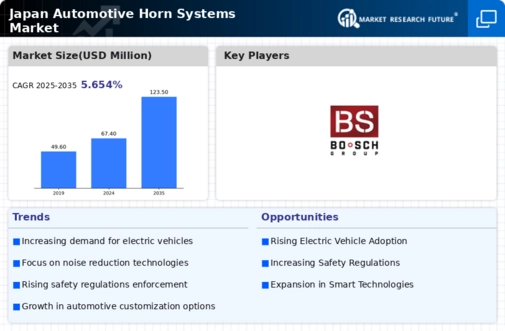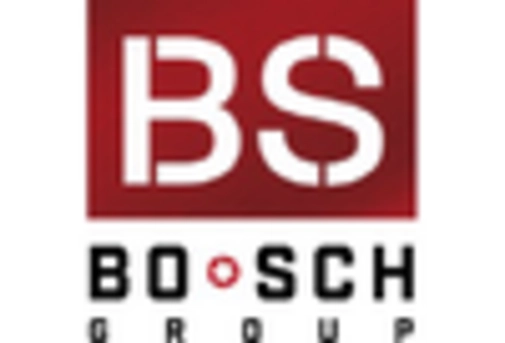Regulatory Compliance
The Japan automotive horn systems market is significantly influenced by stringent safety regulations imposed by the government. The Ministry of Land, Infrastructure, Transport and Tourism (MLIT) has established guidelines that mandate specific sound levels and performance standards for automotive horns. Compliance with these regulations is crucial for manufacturers, as non-compliance can lead to penalties and market exclusion. As a result, companies are compelled to invest in research and development to ensure their products meet these standards. This regulatory landscape not only drives innovation but also fosters a competitive environment within the automotive horn systems market in Japan.
Rising Vehicle Production
The Japan automotive horn systems market is experiencing growth due to the increasing production of vehicles. In 2025, Japan's automotive production reached approximately 8 million units, reflecting a steady demand for automotive components, including horn systems. This surge in vehicle manufacturing is driven by both domestic consumption and export demands. As automakers strive to enhance vehicle safety and functionality, the integration of advanced horn systems becomes essential. Consequently, manufacturers are likely to invest in innovative horn technologies to meet the evolving needs of the automotive sector. This trend suggests a robust future for the automotive horn systems market in Japan, as the industry adapts to the growing production landscape.
Technological Innovations
Technological advancements play a pivotal role in shaping the Japan automotive horn systems market. The integration of electronic horn systems, which offer improved sound quality and reliability, is becoming increasingly prevalent. In recent years, manufacturers have introduced features such as multi-tone horns and customizable sound profiles, catering to consumer preferences. Moreover, the adoption of smart technologies, including connectivity features that allow integration with vehicle systems, is on the rise. This trend indicates that the automotive horn systems market in Japan is likely to witness a shift towards more sophisticated and user-friendly products, enhancing the overall driving experience.
Consumer Preferences for Safety Features
Consumer preferences are increasingly leaning towards enhanced safety features in vehicles, which directly impacts the Japan automotive horn systems market. As awareness of road safety rises, consumers are demanding vehicles equipped with advanced horn systems that provide clear and effective warning signals. This shift in consumer behavior is prompting manufacturers to develop horns that not only meet regulatory standards but also exceed consumer expectations. The growing emphasis on safety is likely to drive the demand for high-quality automotive horn systems, thereby contributing to the overall growth of the market in Japan.
Sustainability and Eco-Friendly Solutions
The Japan automotive horn systems market is witnessing a shift towards sustainability, driven by increasing environmental concerns. Manufacturers are exploring eco-friendly materials and production processes to reduce the carbon footprint of automotive components, including horn systems. The Japanese government has been promoting initiatives aimed at reducing emissions and encouraging the use of sustainable materials in automotive manufacturing. This trend suggests that the automotive horn systems market in Japan may see a rise in products that not only comply with environmental regulations but also appeal to environmentally conscious consumers. As sustainability becomes a priority, the market is likely to evolve, fostering innovation in eco-friendly horn technologies.











